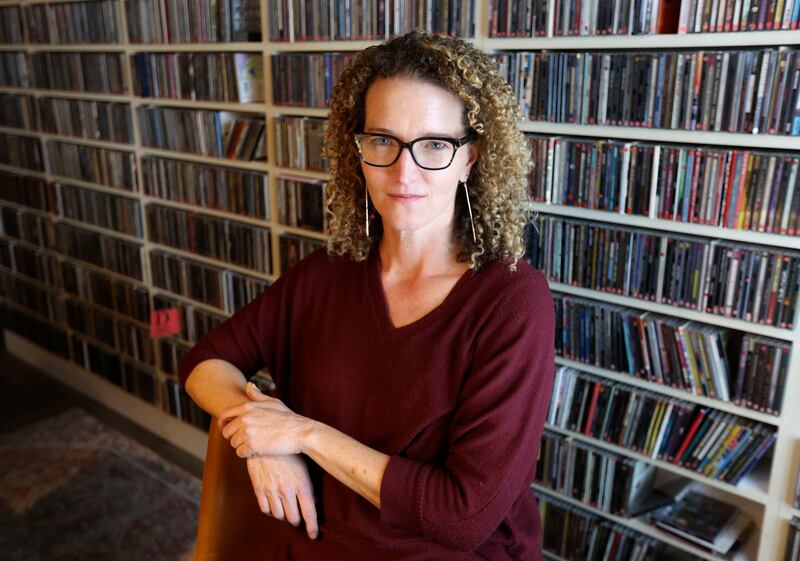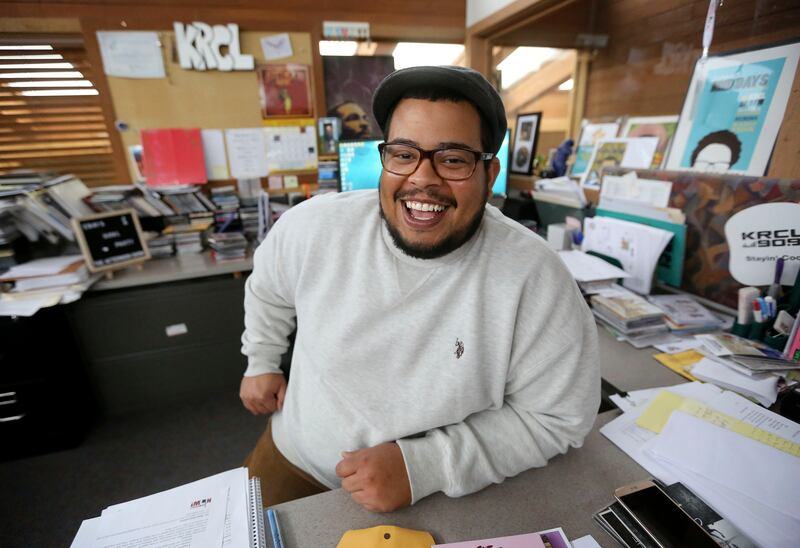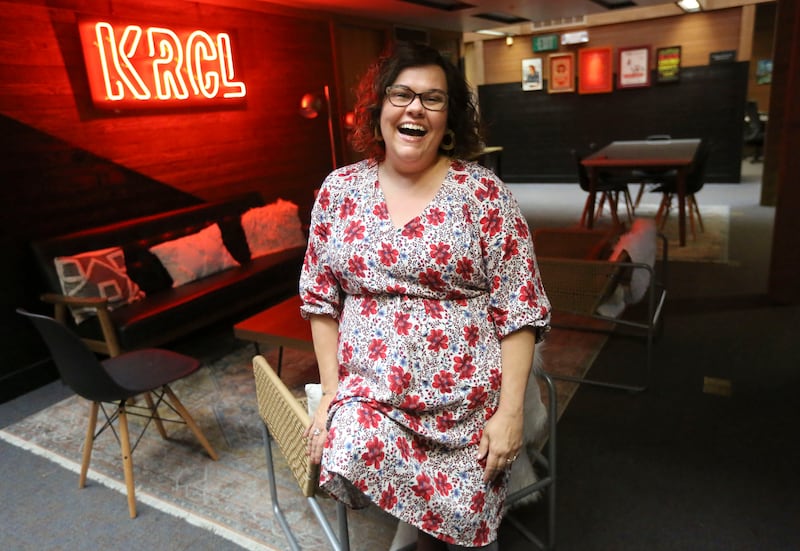SALT LAKE CITY — When Eugenie Jaffe was new at 90.9 KRCL, she’d have literal nightmares of showing up for a broadcast with nothing but kids CDs from her car.
“And I’d be like, ‘Oh my goodness, I have to play The Wiggles?’” Jaffe exclaimed, her face dropping on the word “Wiggles.”
Those particular nightmares were 15 years ago. And no, The Wiggles never actually made it to air. Jaffe still gets nervous, though.
“There’s been times where I played music and my palms get sweaty, because what if people hate it?” she said. “Every day I’m making a mixtape. It’s so scary.”
It was a rather uneventful afternoon at KRCL’s west Salt Lake studio as Jaffe shared memories. Other days haven’t been so peaceful — which might explain the pressure she still feels. Jaffe remembers hosting her midday show the day Prince died. And the day David Bowie died. In 2012, when 20 children were shot dead at Sandy Hook Elementary in Connecticut, she played Stevie Wonder’s “Love’s In Need Of Love Today” and cried.
Capturing a moment with a song isn’t always easy. KRCL’s been doing it for a long time: Dec. 3 marks 40 years since the station’s very first broadcast. KRCL will host a special 3 p.m. show on Dec. 3, featuring clips from that inaugural 1979 broadcast. It’ll also include a playlist of songs that define the station’s four decades. The following night, KRCL hosts a 40th anniversary party/concert at the Union Event Center, featuring local acts Joshy Soul, Talia Keys and Mokie.
The Deseret News interviewed folks from KRCL’s past, present and future about the music and memories that have made the station what it is.

Stephen Holbrook remembers being in a Mississippi church during the “Freedom Summer,” an effort to expand black voter registration during the 1960s. Folk music legend Pete Seeger was at the church, too, to sing for a gathered crowd of civil rights workers. Among other songs, Seeger performed “We Shall Overcome,” one of the civil rights movement’s defining anthems.
When Holbrook launched KRCL 15 years later, he knew which song would usher things in. So, on Dec. 3, 1979, a live version of Seeger’s “We Shall Overcome” became the first song KRCL ever played.
“For me, it was sort of a continuation of what came out of the ’60s and ’70s: a lot of change and desire for inclusion with lots of groups, and the empowerment of lots of groups,” Holbrook told the Deseret News. “I would say at that time — maybe as much as any time in my life — music, culture and politics had a great confluence.”
Holbrook mentioned the station’s early programming slate, which had shows geared toward women, seniors, gays, handicapped folks and different ethnic groups like Polynesians and Latinos.
According to Holbrook, numerous people suggested he launch KRCL at a low wattage with a limited range, since it would be cheaper. Instead, Holbrook went for high wattage, “because the audience that we were interested in didn’t just live in one place,” he said. “They were scattered throughout the Wasatch Front. We needed to be a Wasatch Front station to survive.”
Both the diverse programming and high wattage paid dividends. Tristin Tabish, the station’s current general manager, remembers listening to KRCL in the 1980s, when she was a teen living 20 miles away in rural Magna. At the time she’d been attending small punk shows in downtown Salt Lake, and someone suggested she try KRCL.
“So I turned it on on a Saturday night, and it was this loud, obnoxious Japanese punk rock,” Tabish recalled. “And it was something different every time I tuned it. But every time I tuned it, I heard local voices and information that made me feel like I was a part of something bigger than my small town. … Growing up in Magna was difficult for me, because I felt like I never really fit in.”
In 1991, shortly after graduating high school, Tabish got a job at the station. She recalled being a teen at the KRCL offices, hearing the station undergo a musical evolution that happened in step with the music industry more broadly. Punk acts like Hüsker Dü, Descendents and X began getting airplay in the afternoon, rather than just at midnight. Fringe rock was becoming less fringe.
“You had this kind of granola, folksy element that was sort of a legacy of this station,” she said. “But then more and more hosts started working in the new Pavement album, or Pearl Jam.”
KRCL didn’t just play these burgeoning musicians. They also hosted them in the studio. Tabish remembered a young Jeff Tweedy and his long-haired Wilco bandmates performing at KRCL in the early ’90s, shortly after the band formed.
During those same years, hip-hop was experiencing its golden age. Ebay Hamilton, the station’s program director who also hosts its weekday afternoon show, started at the station in 1993 when he was just 14 years old. KRCL, he said, was Utah’s only station playing hip-hop back then.
As a 14-year-old intern, Hamilton would listen to stacks of hip-hop records, making note of which songs had swear words so they could be cleared for FCC violations. When Wu Tang Clan released their first single, “Protect Ya Neck,” in 1993, Hamilton suspects he was the first person in Utah to hear it.
“I got to know a lot of music in a very condensed, short period of time,” he said.
KRCL’s uniqueness locally has also impacted Salt Lake’s live music scene in some major ways. For numerous midlevel musicians, KRCL has become a key part of their touring.
“I think there are a lot of artists that probably wouldn’t come to Utah if there hadn’t been KRCL,” Hamilton said. “Everyone in Utah that’s a part of the (music) scene in any way, I think KRCL is in their DNA somewhere.”
Tabish remembered getting a call last year from the PR team of alt-country star Jason Isbell. Though Isbell was headlining downtown’s enormous Eccles Theater, KRCL was the only Salt Lake station playing his music. KRCL was asked to be the show’s sole sponsor.

Of course, it hasn’t been all sunshine and roses over the station’s 40 years.
In the mid-2000s, for example, KRCL lost federal funding — which Tabish called “a big, critical moment in the station’s history.” Before this, volunteers hosted all of KRCL’s shows. As part of the shift, though, KRCL began using paid hosts during the weekdays and keeping volunteers for the late night and weekend programs. Some former volunteer hosts, Tabish said, see this as the end of the KRCL they knew and loved, but “many community-based stations have had to make the same changes, because advertising and our federal government grant are all based on how many people are listening — and if we don’t have people using the public service, how do we justify being a public service?
“The trolls will always be there,” she added, “but we have a community who have supported us for four decades.”
Tabish mentioned the Flaming Lips song “Do You Realize??”, in which lead singer Wayne Coyne sings:
Do you realize that you have the most beautiful face?
Do you realize we’re floating in space?
Do you realize that happiness makes you cry?
Do you realize that everyone you know someday will die?
And instead of saying all of your goodbyes
Let them know you realize that life goes fast
It’s hard to make the good things last
“That song reflects … the beauty of humanity coming in and out of these doors,” Tabish said. “People love to be asked to help the station, and they come out from everywhere in these unexpected, beautiful ways. And we feel it constantly.”
Jaffe described Salt Lake City as “the Rome of the United States” — a large city with a major world religion at its center. She thinks KRCL teaches listeners that Utah is many things to many people, and that all those things can coexist and bloom in their own way.
“Hopefully KRCL is continuing to bring people together and not push people apart,” she added. “And it’s all through music. What better way to learn about somebody else than through music?”



